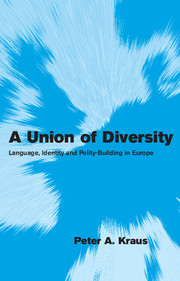Book contents
- Frontmatter
- Contents
- List of Tables and Figure
- Preface
- Acknowledgments
- A Union of Diversity
- 1 Introduction: The dynamics of European integration
- 2 The European Union's democratic deficit and the search for a European demos
- 3 The identity of a multinational polity
- 4 Language and politics: A challenge for Europe
- 5 The language question in the institutional complex of the European Union
- 6 Political communication in the transnational civil society
- 7 Recognition, self-determination and integration in a union of diversity
- References
- Index
- Titles in the series
1 - Introduction: The dynamics of European integration
Published online by Cambridge University Press: 22 September 2009
- Frontmatter
- Contents
- List of Tables and Figure
- Preface
- Acknowledgments
- A Union of Diversity
- 1 Introduction: The dynamics of European integration
- 2 The European Union's democratic deficit and the search for a European demos
- 3 The identity of a multinational polity
- 4 Language and politics: A challenge for Europe
- 5 The language question in the institutional complex of the European Union
- 6 Political communication in the transnational civil society
- 7 Recognition, self-determination and integration in a union of diversity
- References
- Index
- Titles in the series
Summary
The ‘European question’, namely, the question concerning the foundations of the political unification of Europe and its prospects of success, has by now become primarily a question of democracy. It touches, on the one hand, upon the impacts of processes of Europeanization on democratic will-formation in the member states of the European Union (EU) and, on the other, upon the possibilities of a democratization of the Union itself. Both aspects of the question have become objects of heated controversies that have long since spread beyond the boundaries of academic circles and have secured a fixed and prominent place on the political agenda. As the debates on the unfortunate European constitution have revealed, the fronts in these controversies are quite intricate, depending on ideological preference and national background. Nevertheless, one can discern a rough polarization between those who sceptically regard integration as a progressive hollowing out of the sovereignty of the democratic nation-state and those who embrace it instead as an opportunity to disclose new democratic options beyond the nation-state.
However, there appears to be widespread agreement, notwithstanding numerous other conflicts, that the technocratic approach of the initial decades of integration is no longer viable. Since the adoption and ratification of the Treaty on European Union at the beginning of the 1990s, the situation has been marked by continuing – and some would say, increasingly acute – problems of legitimation of policy-making at the European level and by a more and more contentious treatment of European issues in the domestic affairs of the nation-states.
- Type
- Chapter
- Information
- A Union of DiversityLanguage, Identity and Polity-Building in Europe, pp. 1 - 12Publisher: Cambridge University PressPrint publication year: 2008

